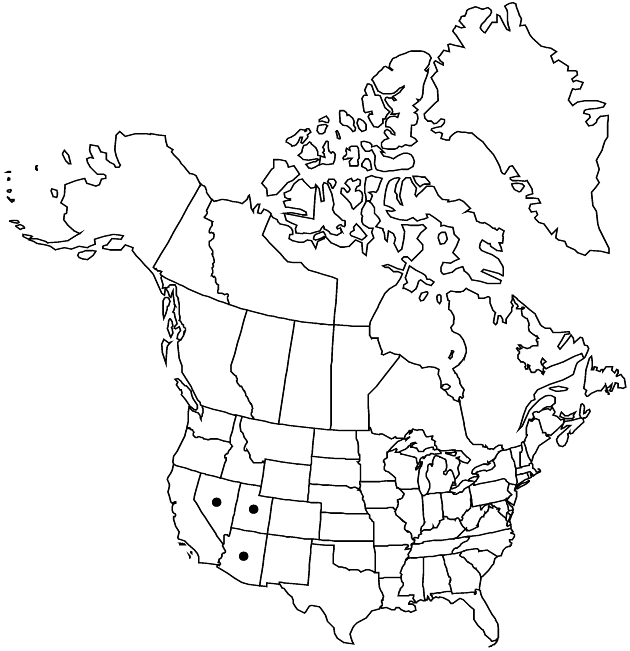Difference between revisions of "Xylorhiza tortifolia var. imberbis"
Brittonia 29: 211. 1977.
Common names: Smooth Mojave woody-aster
Endemic
Basionym: Machaeranthera tortifolia var. imberbis Cronquist Leafl. W. Bot. 10: 12. 1963
FNA>Volume Importer |
imported>Volume Importer |
||
| (3 intermediate revisions by 2 users not shown) | |||
| Line 8: | Line 8: | ||
}} | }} | ||
|common_names=Smooth Mojave woody-aster | |common_names=Smooth Mojave woody-aster | ||
| + | |special_status={{Treatment/ID/Special_status | ||
| + | |code=E | ||
| + | |label=Endemic | ||
| + | }} | ||
|basionyms={{Treatment/ID/Basionym | |basionyms={{Treatment/ID/Basionym | ||
|name=Machaeranthera tortifolia var. imberbis | |name=Machaeranthera tortifolia var. imberbis | ||
|authority=Cronquist | |authority=Cronquist | ||
| + | |rank=variety | ||
|publication_title=Leafl. W. Bot. | |publication_title=Leafl. W. Bot. | ||
|publication_place=10: 12. 1963 | |publication_place=10: 12. 1963 | ||
| Line 29: | Line 34: | ||
|elevation=600–1900 m | |elevation=600–1900 m | ||
|distribution=Ariz.;Nev.;Utah. | |distribution=Ariz.;Nev.;Utah. | ||
| − | |discussion=<p>The geographic distribution of < | + | |discussion=<p>The geographic distribution of <i></i>var.<i> imberbis</i> usually follows the canyons of the Colorado River of Utah and adjacent Arizona at least to Toroweap Point; it also occurs in Clark and Nye counties, <i>Nevada</i>, where it intergrades with <i></i>var.<i> tortifolia</i> (A. Cronquist 1994).</p> |
|tables= | |tables= | ||
|references= | |references= | ||
| Line 38: | Line 43: | ||
-->{{#Taxon: | -->{{#Taxon: | ||
name=Xylorhiza tortifolia var. imberbis | name=Xylorhiza tortifolia var. imberbis | ||
| − | |||
|authority=(Cronquist) T. J. Watson | |authority=(Cronquist) T. J. Watson | ||
|rank=variety | |rank=variety | ||
| Line 52: | Line 56: | ||
|publication title=Brittonia | |publication title=Brittonia | ||
|publication year=1977 | |publication year=1977 | ||
| − | |special status= | + | |special status=Endemic |
| − | |source xml=https:// | + | |source xml=https://bitbucket.org/aafc-mbb/fna-data-curation/src/2e0870ddd59836b60bcf96646a41e87ea5a5943a/coarse_grained_fna_xml/V19-20-21/V20_936.xml |
|tribe=Asteraceae tribe Astereae | |tribe=Asteraceae tribe Astereae | ||
|genus=Xylorhiza | |genus=Xylorhiza | ||
Latest revision as of 20:06, 5 November 2020
Stems, leaves, and involucres glabrous, stipitate-glandular. Leaf margins sparsely piloso-villous to puberulent. 2n = 12.
Phenology: Flowering Apr–May(–Jun).
Habitat: Sandy or gravelly slopes and flats, in pinyon-juniper, sagebrush, and blackbrush zones
Elevation: 600–1900 m
Distribution

Ariz., Nev., Utah.
Discussion
The geographic distribution of var. imberbis usually follows the canyons of the Colorado River of Utah and adjacent Arizona at least to Toroweap Point; it also occurs in Clark and Nye counties, Nevada, where it intergrades with var. tortifolia (A. Cronquist 1994).
Selected References
None.
Lower Taxa
None.